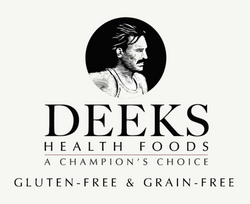Rob de Castella, AO MBE
Deeks Co-Founder
How many is too many eggs? Is there such a thing? We look at the benefits of eggs as a component of a gluten and grain free diet. We tackle some common myths about one of nature’s super foods and dive deeper into the nutritional benefits.
Have you ever heard someone tell you that you shouldn’t eat too many eggs? Or more specifically, that eggs aren’t good for your cholesterol and you shouldn’t be eating more than two a week? Well, we have learnt a lot since this school of thought was a commonly held opinion and you will generally find that nutritionists and medical professionals, think the humble egg is one of the super-foods that we should include as a staple in our diet.
Eggs are commonly known to be a nutrient-rich food source that is beneficial for most people, particularly those with very limited diets.
Are you on a strict diet? Do you struggle to replenish vital nutrients?
If you’re not allergic, you might want to consider adding eggs back into your diet because eggs pack a mighty punch in the macro and micro-nutrient department. If I can use the ‘power-to-weight’ analogy to compare nutrient properties in eggs versus chicken [flesh] for example, eggs hold their own and, in most cases, out-perform its fully developed kin.
The green coloured figures in the table below denotes the nutrient that is more abundantly found per 100g of of either egg or chicken flesh.

The good stuff
The main benefits of eggs are due to the ingredients below:
-
Protein: eggs are high in protein which assists in helping you feel full and can control blood sugar which is important for maintaining healthy weight and may assist in preventing diabetes.
-
Choline: found in the yolk, choline fosters brain development, particularly in growing children.
-
Lutein and Zeaxanthin: these two phytochemicals are linked to eye health particularly in the prevention of cataracts and macular degeneration.
-
Vitamin D: you can get your vitamin D from sunshine but you can also find it in eggs yolks. Vitamin D aids the absorption of calcium, important for those with coeliac disease, particularly those diagnosed later in life who may have health issues related to poorly absorbing nutrients.
What you may not know about eggs
-
Eggs contain the highest quality protein you can consume from food.
-
Due to their high vitamin content, eggs have been described as nature’s vitamin pill.
-
The colour of an egg yolk is determined by what the hen eats. The more yellow and orange plant pigments there are in the grain fed to a hen, the more vibrant the colour of the yolk will be.
-
Plants and insects are the most desirable diet for the best chicken eggs.
-
The larger the egg, the older the hen.
-
Egg yolks are one of the few foods that are a good source of Vitamin D.
Understanding eggs
Most of us know the difference between caged and free-range eggs but there are other considerations when choosing the eggs you eat. Below are the options you may have when selecting your eggs:
-
Conventional eggs: standard supermarket eggs. The hens that lay these eggs are usually fed grain, supplemented with vitamins and minerals.
-
Organic eggs: hens are not treated with hormones and receive organic feed.
-
Pastured eggs: chickens are allowed to roam free, eating plants and insects (their natural food) along with some commercial feed.
-
Omega-3-enriched eggs: these are conventional chickens that have their feed supplemented with an omega-3 source like flax seeds.
It is generally assumed that natural is best where possible and that pastured, free-range eggs will give us the best access to the nutrients we need from eggs.
Your body needs cholesterol and knows how to balance it naturally
Cholesterol plays a very important function in your body. It’s a structural molecule that is essential to every cell membrane. It is also used to make steroid hormones like testosterone, estrogen and cortisol.
The human body has evolved to ensure that we always has enough available. Sometimes deriving cholesterol from your diet isn't always an option, so your liver will produce enough to meet your body’s needs. And just as the liver produces cholesterol, it knows when to slow the production down. When you eat a lot of cholesterol-rich foods, your liver decreases the production of cholesterol to keep levels from becoming excessively high Therefore, the total amount of cholesterol in your body changes only very little, if at all. What changes is its source — your diet or your liver.
Eggs and heart health
The viewpoint that eggs are not an ‘everyday food’ stemmed from the belief that high cholesterol content caused them to have an impact on heart disease and other medical conditions related to the heart, such as stroke.
At the turn of the 20th century, a scientist named Nikolai Anichkov fed rabbits a diet of pure cholesterol. Their arteries clogged, and the concept that cholesterol causes heart disease was born. Later, in the 1950s, Ancel Keys published a well-known study that concluded that people from cultures that ate the most animal fat were most likely to develop heart disease. These two studies proved highly influential and the presupposition that foods high in cholesterol, such as eggs and animal fat, are not everyday foods.
70 years on, there is not a lot of definitive evidence that eggs can be directly associated with being the cause of heart disease, if consumed too frequently.
According to the Australian Heart Foundation, “eggs are a complete source of protein, vitamin A, E and B12, selenium choline and iron and cholesterol. However, the cholesterol in eggs has minimal effect on blood cholesterol.”
“Foods high in saturated fat and trans-fat have the greatest impact on your cholesterol levels. The neutral relationship between eggs and heart health means eggs neither increase nor decrease the risk of heart disease in most people.”
The Heart Foundation does not set a limit on the number of eggs you should eat a week. However, some people are more sensitive to eating dietary cholesterol than others. A maximum of seven eggs a week is recommended for those with:
-
High LDL cholesterol (bad cholesterol)
-
Type 2 diabetes
-
Existing heart disease

